Strategic HRM and Individual Performance Pay at Aldi
VerifiedAdded on 2023/01/07
|8
|2748
|98
Essay
AI Summary
This essay critically evaluates the impact of individual performance pay (IPRP) on employee performance within the context of Aldi's strategic human resource management (SHRM). The introduction establishes the importance of SHRM in achieving organizational goals, highlighting the role of HR functions like recruitment and training. The main body delves into the effectiveness of IPRP, exploring scenarios where it motivates employees, such as when financial incentives are a primary driver, particularly in sales roles with performance-based targets. It also examines situations where IPRP may not be as effective, including potential demotivation due to perceived inequities or when other factors beyond monetary rewards influence employee behavior. The essay concludes by summarizing the key findings, reinforcing the significance of strategic HRM and the nuanced role of IPRP in enhancing employee and overall company performance.
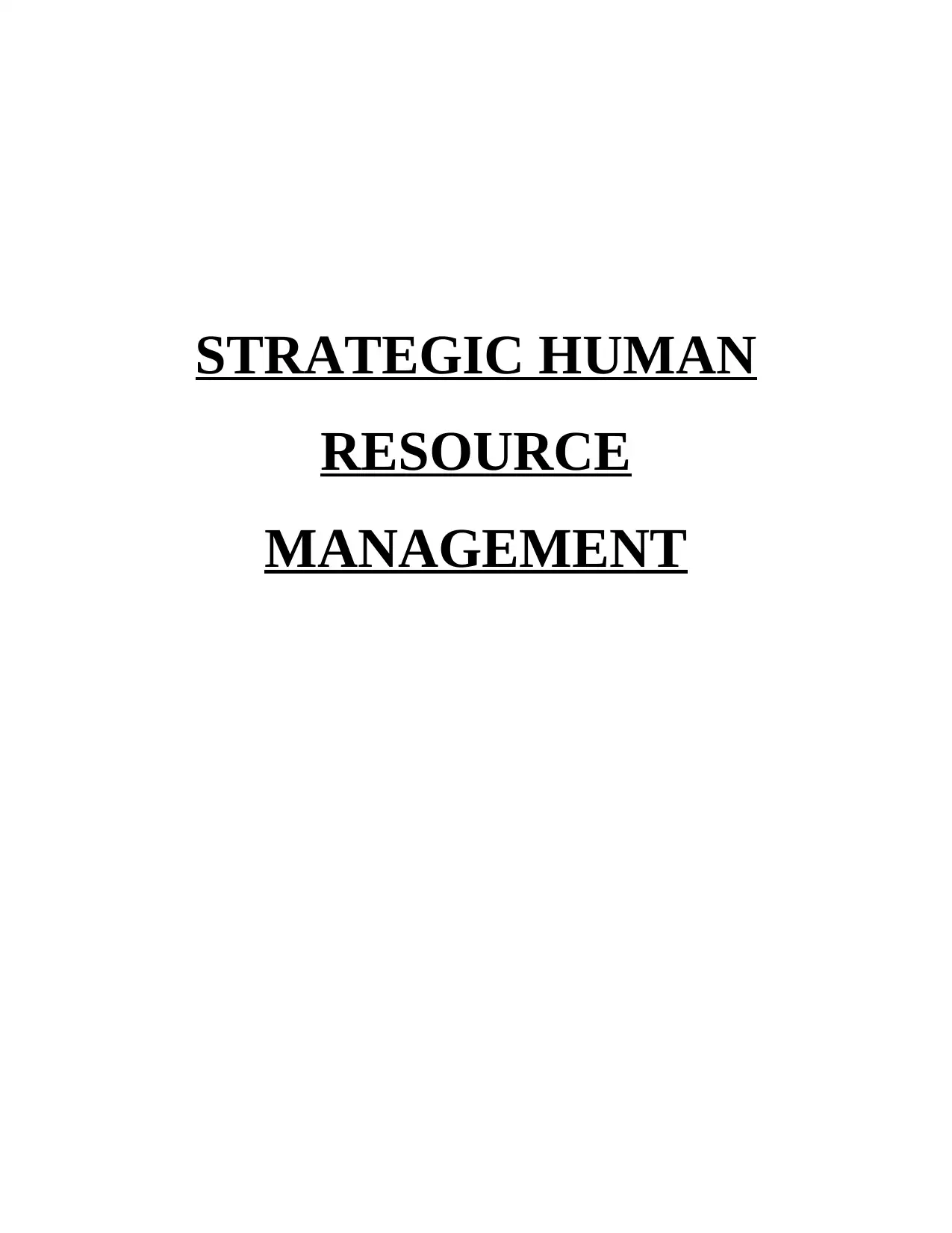
STRATEGIC HUMAN
RESOURCE
MANAGEMENT
RESOURCE
MANAGEMENT
Paraphrase This Document
Need a fresh take? Get an instant paraphrase of this document with our AI Paraphraser
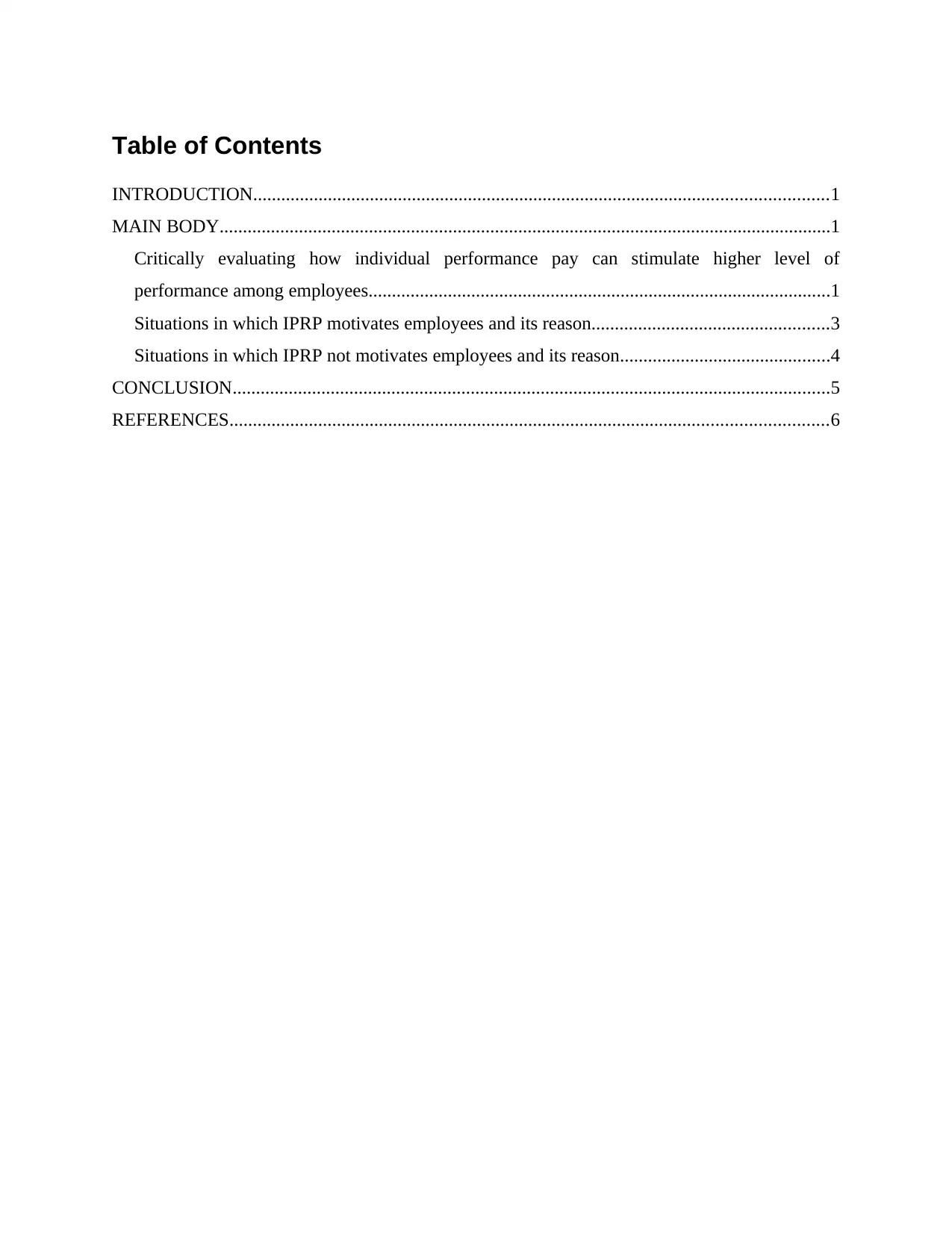
Table of Contents
INTRODUCTION...........................................................................................................................1
MAIN BODY...................................................................................................................................1
Critically evaluating how individual performance pay can stimulate higher level of
performance among employees...................................................................................................1
Situations in which IPRP motivates employees and its reason...................................................3
Situations in which IPRP not motivates employees and its reason.............................................4
CONCLUSION................................................................................................................................5
REFERENCES................................................................................................................................6
INTRODUCTION...........................................................................................................................1
MAIN BODY...................................................................................................................................1
Critically evaluating how individual performance pay can stimulate higher level of
performance among employees...................................................................................................1
Situations in which IPRP motivates employees and its reason...................................................3
Situations in which IPRP not motivates employees and its reason.............................................4
CONCLUSION................................................................................................................................5
REFERENCES................................................................................................................................6
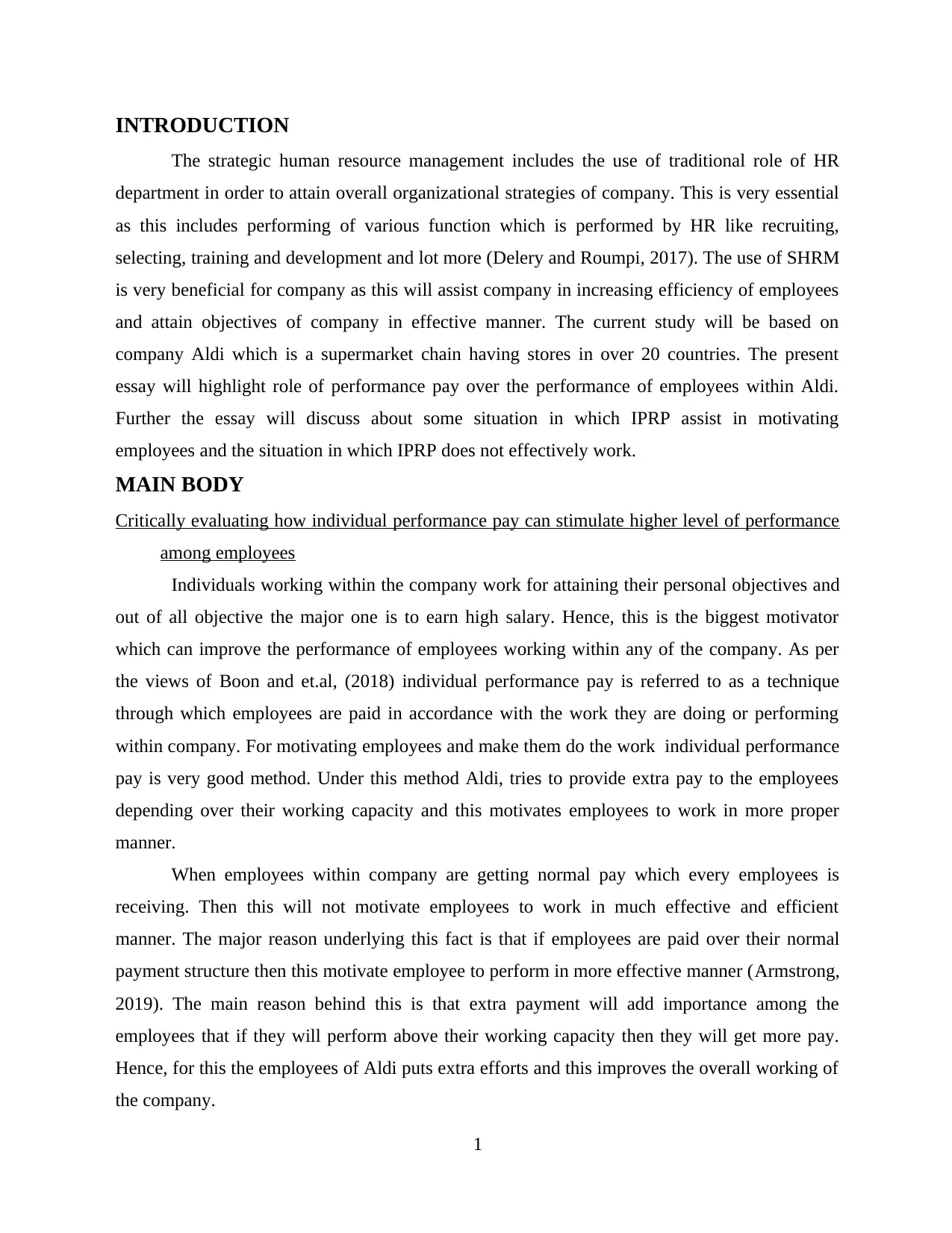
INTRODUCTION
The strategic human resource management includes the use of traditional role of HR
department in order to attain overall organizational strategies of company. This is very essential
as this includes performing of various function which is performed by HR like recruiting,
selecting, training and development and lot more (Delery and Roumpi, 2017). The use of SHRM
is very beneficial for company as this will assist company in increasing efficiency of employees
and attain objectives of company in effective manner. The current study will be based on
company Aldi which is a supermarket chain having stores in over 20 countries. The present
essay will highlight role of performance pay over the performance of employees within Aldi.
Further the essay will discuss about some situation in which IPRP assist in motivating
employees and the situation in which IPRP does not effectively work.
MAIN BODY
Critically evaluating how individual performance pay can stimulate higher level of performance
among employees
Individuals working within the company work for attaining their personal objectives and
out of all objective the major one is to earn high salary. Hence, this is the biggest motivator
which can improve the performance of employees working within any of the company. As per
the views of Boon and et.al, (2018) individual performance pay is referred to as a technique
through which employees are paid in accordance with the work they are doing or performing
within company. For motivating employees and make them do the work individual performance
pay is very good method. Under this method Aldi, tries to provide extra pay to the employees
depending over their working capacity and this motivates employees to work in more proper
manner.
When employees within company are getting normal pay which every employees is
receiving. Then this will not motivate employees to work in much effective and efficient
manner. The major reason underlying this fact is that if employees are paid over their normal
payment structure then this motivate employee to perform in more effective manner (Armstrong,
2019). The main reason behind this is that extra payment will add importance among the
employees that if they will perform above their working capacity then they will get more pay.
Hence, for this the employees of Aldi puts extra efforts and this improves the overall working of
the company.
1
The strategic human resource management includes the use of traditional role of HR
department in order to attain overall organizational strategies of company. This is very essential
as this includes performing of various function which is performed by HR like recruiting,
selecting, training and development and lot more (Delery and Roumpi, 2017). The use of SHRM
is very beneficial for company as this will assist company in increasing efficiency of employees
and attain objectives of company in effective manner. The current study will be based on
company Aldi which is a supermarket chain having stores in over 20 countries. The present
essay will highlight role of performance pay over the performance of employees within Aldi.
Further the essay will discuss about some situation in which IPRP assist in motivating
employees and the situation in which IPRP does not effectively work.
MAIN BODY
Critically evaluating how individual performance pay can stimulate higher level of performance
among employees
Individuals working within the company work for attaining their personal objectives and
out of all objective the major one is to earn high salary. Hence, this is the biggest motivator
which can improve the performance of employees working within any of the company. As per
the views of Boon and et.al, (2018) individual performance pay is referred to as a technique
through which employees are paid in accordance with the work they are doing or performing
within company. For motivating employees and make them do the work individual performance
pay is very good method. Under this method Aldi, tries to provide extra pay to the employees
depending over their working capacity and this motivates employees to work in more proper
manner.
When employees within company are getting normal pay which every employees is
receiving. Then this will not motivate employees to work in much effective and efficient
manner. The major reason underlying this fact is that if employees are paid over their normal
payment structure then this motivate employee to perform in more effective manner (Armstrong,
2019). The main reason behind this is that extra payment will add importance among the
employees that if they will perform above their working capacity then they will get more pay.
Hence, for this the employees of Aldi puts extra efforts and this improves the overall working of
the company.
1
⊘ This is a preview!⊘
Do you want full access?
Subscribe today to unlock all pages.

Trusted by 1+ million students worldwide
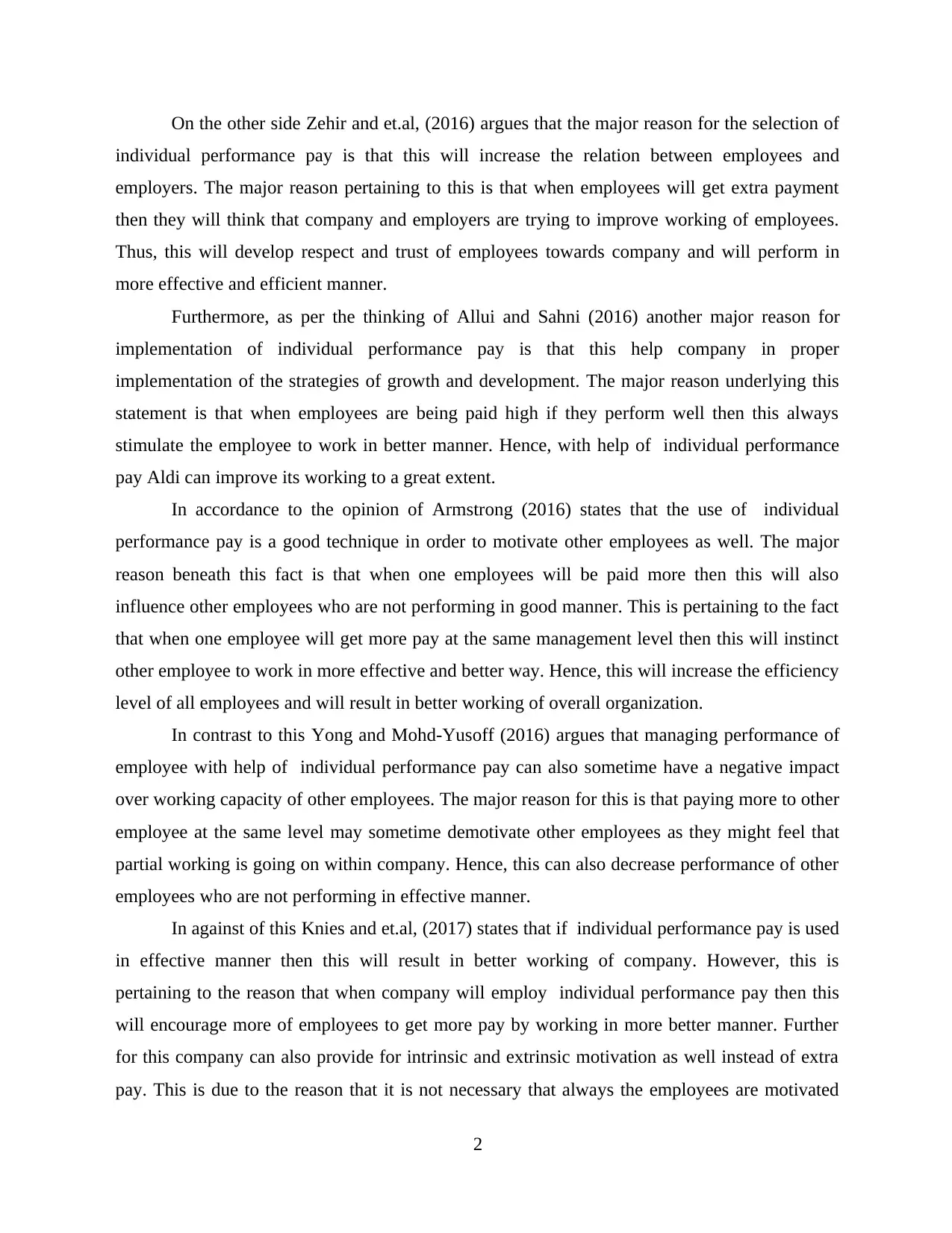
On the other side Zehir and et.al, (2016) argues that the major reason for the selection of
individual performance pay is that this will increase the relation between employees and
employers. The major reason pertaining to this is that when employees will get extra payment
then they will think that company and employers are trying to improve working of employees.
Thus, this will develop respect and trust of employees towards company and will perform in
more effective and efficient manner.
Furthermore, as per the thinking of Allui and Sahni (2016) another major reason for
implementation of individual performance pay is that this help company in proper
implementation of the strategies of growth and development. The major reason underlying this
statement is that when employees are being paid high if they perform well then this always
stimulate the employee to work in better manner. Hence, with help of individual performance
pay Aldi can improve its working to a great extent.
In accordance to the opinion of Armstrong (2016) states that the use of individual
performance pay is a good technique in order to motivate other employees as well. The major
reason beneath this fact is that when one employees will be paid more then this will also
influence other employees who are not performing in good manner. This is pertaining to the fact
that when one employee will get more pay at the same management level then this will instinct
other employee to work in more effective and better way. Hence, this will increase the efficiency
level of all employees and will result in better working of overall organization.
In contrast to this Yong and Mohd-Yusoff (2016) argues that managing performance of
employee with help of individual performance pay can also sometime have a negative impact
over working capacity of other employees. The major reason for this is that paying more to other
employee at the same level may sometime demotivate other employees as they might feel that
partial working is going on within company. Hence, this can also decrease performance of other
employees who are not performing in effective manner.
In against of this Knies and et.al, (2017) states that if individual performance pay is used
in effective manner then this will result in better working of company. However, this is
pertaining to the reason that when company will employ individual performance pay then this
will encourage more of employees to get more pay by working in more better manner. Further
for this company can also provide for intrinsic and extrinsic motivation as well instead of extra
pay. This is due to the reason that it is not necessary that always the employees are motivated
2
individual performance pay is that this will increase the relation between employees and
employers. The major reason pertaining to this is that when employees will get extra payment
then they will think that company and employers are trying to improve working of employees.
Thus, this will develop respect and trust of employees towards company and will perform in
more effective and efficient manner.
Furthermore, as per the thinking of Allui and Sahni (2016) another major reason for
implementation of individual performance pay is that this help company in proper
implementation of the strategies of growth and development. The major reason underlying this
statement is that when employees are being paid high if they perform well then this always
stimulate the employee to work in better manner. Hence, with help of individual performance
pay Aldi can improve its working to a great extent.
In accordance to the opinion of Armstrong (2016) states that the use of individual
performance pay is a good technique in order to motivate other employees as well. The major
reason beneath this fact is that when one employees will be paid more then this will also
influence other employees who are not performing in good manner. This is pertaining to the fact
that when one employee will get more pay at the same management level then this will instinct
other employee to work in more effective and better way. Hence, this will increase the efficiency
level of all employees and will result in better working of overall organization.
In contrast to this Yong and Mohd-Yusoff (2016) argues that managing performance of
employee with help of individual performance pay can also sometime have a negative impact
over working capacity of other employees. The major reason for this is that paying more to other
employee at the same level may sometime demotivate other employees as they might feel that
partial working is going on within company. Hence, this can also decrease performance of other
employees who are not performing in effective manner.
In against of this Knies and et.al, (2017) states that if individual performance pay is used
in effective manner then this will result in better working of company. However, this is
pertaining to the reason that when company will employ individual performance pay then this
will encourage more of employees to get more pay by working in more better manner. Further
for this company can also provide for intrinsic and extrinsic motivation as well instead of extra
pay. This is due to the reason that it is not necessary that always the employees are motivated
2
Paraphrase This Document
Need a fresh take? Get an instant paraphrase of this document with our AI Paraphraser
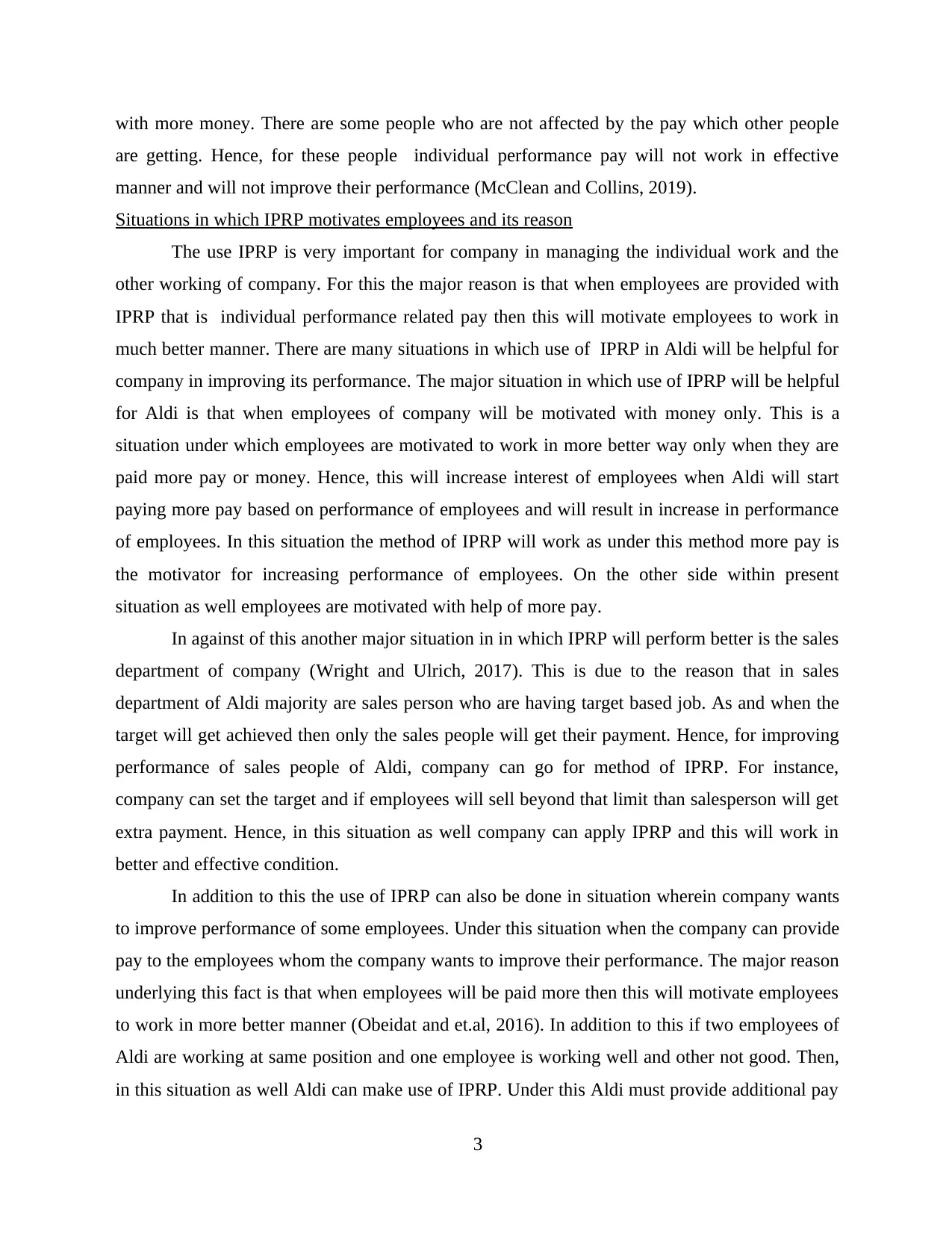
with more money. There are some people who are not affected by the pay which other people
are getting. Hence, for these people individual performance pay will not work in effective
manner and will not improve their performance (McClean and Collins, 2019).
Situations in which IPRP motivates employees and its reason
The use IPRP is very important for company in managing the individual work and the
other working of company. For this the major reason is that when employees are provided with
IPRP that is individual performance related pay then this will motivate employees to work in
much better manner. There are many situations in which use of IPRP in Aldi will be helpful for
company in improving its performance. The major situation in which use of IPRP will be helpful
for Aldi is that when employees of company will be motivated with money only. This is a
situation under which employees are motivated to work in more better way only when they are
paid more pay or money. Hence, this will increase interest of employees when Aldi will start
paying more pay based on performance of employees and will result in increase in performance
of employees. In this situation the method of IPRP will work as under this method more pay is
the motivator for increasing performance of employees. On the other side within present
situation as well employees are motivated with help of more pay.
In against of this another major situation in in which IPRP will perform better is the sales
department of company (Wright and Ulrich, 2017). This is due to the reason that in sales
department of Aldi majority are sales person who are having target based job. As and when the
target will get achieved then only the sales people will get their payment. Hence, for improving
performance of sales people of Aldi, company can go for method of IPRP. For instance,
company can set the target and if employees will sell beyond that limit than salesperson will get
extra payment. Hence, in this situation as well company can apply IPRP and this will work in
better and effective condition.
In addition to this the use of IPRP can also be done in situation wherein company wants
to improve performance of some employees. Under this situation when the company can provide
pay to the employees whom the company wants to improve their performance. The major reason
underlying this fact is that when employees will be paid more then this will motivate employees
to work in more better manner (Obeidat and et.al, 2016). In addition to this if two employees of
Aldi are working at same position and one employee is working well and other not good. Then,
in this situation as well Aldi can make use of IPRP. Under this Aldi must provide additional pay
3
are getting. Hence, for these people individual performance pay will not work in effective
manner and will not improve their performance (McClean and Collins, 2019).
Situations in which IPRP motivates employees and its reason
The use IPRP is very important for company in managing the individual work and the
other working of company. For this the major reason is that when employees are provided with
IPRP that is individual performance related pay then this will motivate employees to work in
much better manner. There are many situations in which use of IPRP in Aldi will be helpful for
company in improving its performance. The major situation in which use of IPRP will be helpful
for Aldi is that when employees of company will be motivated with money only. This is a
situation under which employees are motivated to work in more better way only when they are
paid more pay or money. Hence, this will increase interest of employees when Aldi will start
paying more pay based on performance of employees and will result in increase in performance
of employees. In this situation the method of IPRP will work as under this method more pay is
the motivator for increasing performance of employees. On the other side within present
situation as well employees are motivated with help of more pay.
In against of this another major situation in in which IPRP will perform better is the sales
department of company (Wright and Ulrich, 2017). This is due to the reason that in sales
department of Aldi majority are sales person who are having target based job. As and when the
target will get achieved then only the sales people will get their payment. Hence, for improving
performance of sales people of Aldi, company can go for method of IPRP. For instance,
company can set the target and if employees will sell beyond that limit than salesperson will get
extra payment. Hence, in this situation as well company can apply IPRP and this will work in
better and effective condition.
In addition to this the use of IPRP can also be done in situation wherein company wants
to improve performance of some employees. Under this situation when the company can provide
pay to the employees whom the company wants to improve their performance. The major reason
underlying this fact is that when employees will be paid more then this will motivate employees
to work in more better manner (Obeidat and et.al, 2016). In addition to this if two employees of
Aldi are working at same position and one employee is working well and other not good. Then,
in this situation as well Aldi can make use of IPRP. Under this Aldi must provide additional pay
3
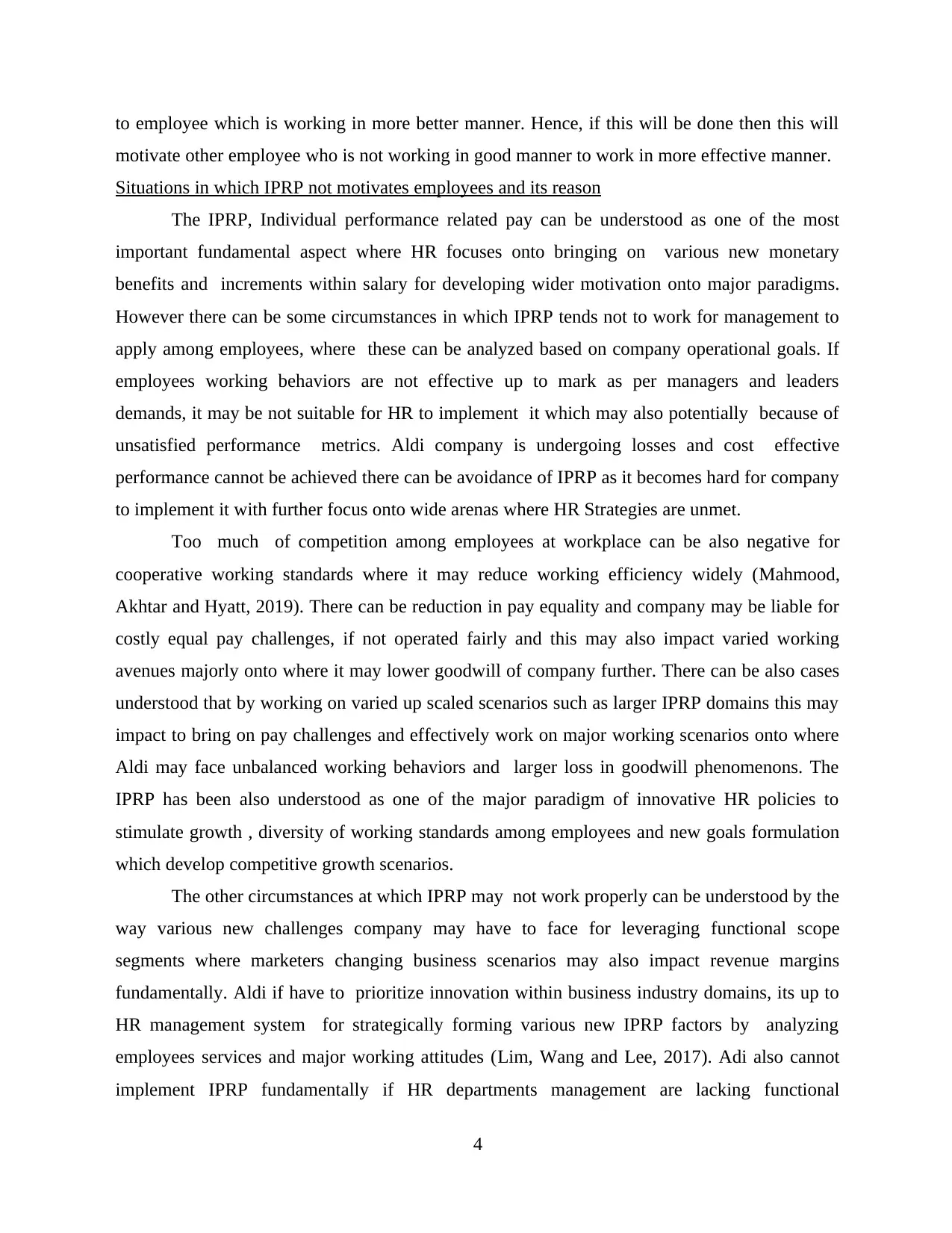
to employee which is working in more better manner. Hence, if this will be done then this will
motivate other employee who is not working in good manner to work in more effective manner.
Situations in which IPRP not motivates employees and its reason
The IPRP, Individual performance related pay can be understood as one of the most
important fundamental aspect where HR focuses onto bringing on various new monetary
benefits and increments within salary for developing wider motivation onto major paradigms.
However there can be some circumstances in which IPRP tends not to work for management to
apply among employees, where these can be analyzed based on company operational goals. If
employees working behaviors are not effective up to mark as per managers and leaders
demands, it may be not suitable for HR to implement it which may also potentially because of
unsatisfied performance metrics. Aldi company is undergoing losses and cost effective
performance cannot be achieved there can be avoidance of IPRP as it becomes hard for company
to implement it with further focus onto wide arenas where HR Strategies are unmet.
Too much of competition among employees at workplace can be also negative for
cooperative working standards where it may reduce working efficiency widely (Mahmood,
Akhtar and Hyatt, 2019). There can be reduction in pay equality and company may be liable for
costly equal pay challenges, if not operated fairly and this may also impact varied working
avenues majorly onto where it may lower goodwill of company further. There can be also cases
understood that by working on varied up scaled scenarios such as larger IPRP domains this may
impact to bring on pay challenges and effectively work on major working scenarios onto where
Aldi may face unbalanced working behaviors and larger loss in goodwill phenomenons. The
IPRP has been also understood as one of the major paradigm of innovative HR policies to
stimulate growth , diversity of working standards among employees and new goals formulation
which develop competitive growth scenarios.
The other circumstances at which IPRP may not work properly can be understood by the
way various new challenges company may have to face for leveraging functional scope
segments where marketers changing business scenarios may also impact revenue margins
fundamentally. Aldi if have to prioritize innovation within business industry domains, its up to
HR management system for strategically forming various new IPRP factors by analyzing
employees services and major working attitudes (Lim, Wang and Lee, 2017). Adi also cannot
implement IPRP fundamentally if HR departments management are lacking functional
4
motivate other employee who is not working in good manner to work in more effective manner.
Situations in which IPRP not motivates employees and its reason
The IPRP, Individual performance related pay can be understood as one of the most
important fundamental aspect where HR focuses onto bringing on various new monetary
benefits and increments within salary for developing wider motivation onto major paradigms.
However there can be some circumstances in which IPRP tends not to work for management to
apply among employees, where these can be analyzed based on company operational goals. If
employees working behaviors are not effective up to mark as per managers and leaders
demands, it may be not suitable for HR to implement it which may also potentially because of
unsatisfied performance metrics. Aldi company is undergoing losses and cost effective
performance cannot be achieved there can be avoidance of IPRP as it becomes hard for company
to implement it with further focus onto wide arenas where HR Strategies are unmet.
Too much of competition among employees at workplace can be also negative for
cooperative working standards where it may reduce working efficiency widely (Mahmood,
Akhtar and Hyatt, 2019). There can be reduction in pay equality and company may be liable for
costly equal pay challenges, if not operated fairly and this may also impact varied working
avenues majorly onto where it may lower goodwill of company further. There can be also cases
understood that by working on varied up scaled scenarios such as larger IPRP domains this may
impact to bring on pay challenges and effectively work on major working scenarios onto where
Aldi may face unbalanced working behaviors and larger loss in goodwill phenomenons. The
IPRP has been also understood as one of the major paradigm of innovative HR policies to
stimulate growth , diversity of working standards among employees and new goals formulation
which develop competitive growth scenarios.
The other circumstances at which IPRP may not work properly can be understood by the
way various new challenges company may have to face for leveraging functional scope
segments where marketers changing business scenarios may also impact revenue margins
fundamentally. Aldi if have to prioritize innovation within business industry domains, its up to
HR management system for strategically forming various new IPRP factors by analyzing
employees services and major working attitudes (Lim, Wang and Lee, 2017). Adi also cannot
implement IPRP fundamentally if HR departments management are lacking functional
4
⊘ This is a preview!⊘
Do you want full access?
Subscribe today to unlock all pages.

Trusted by 1+ million students worldwide
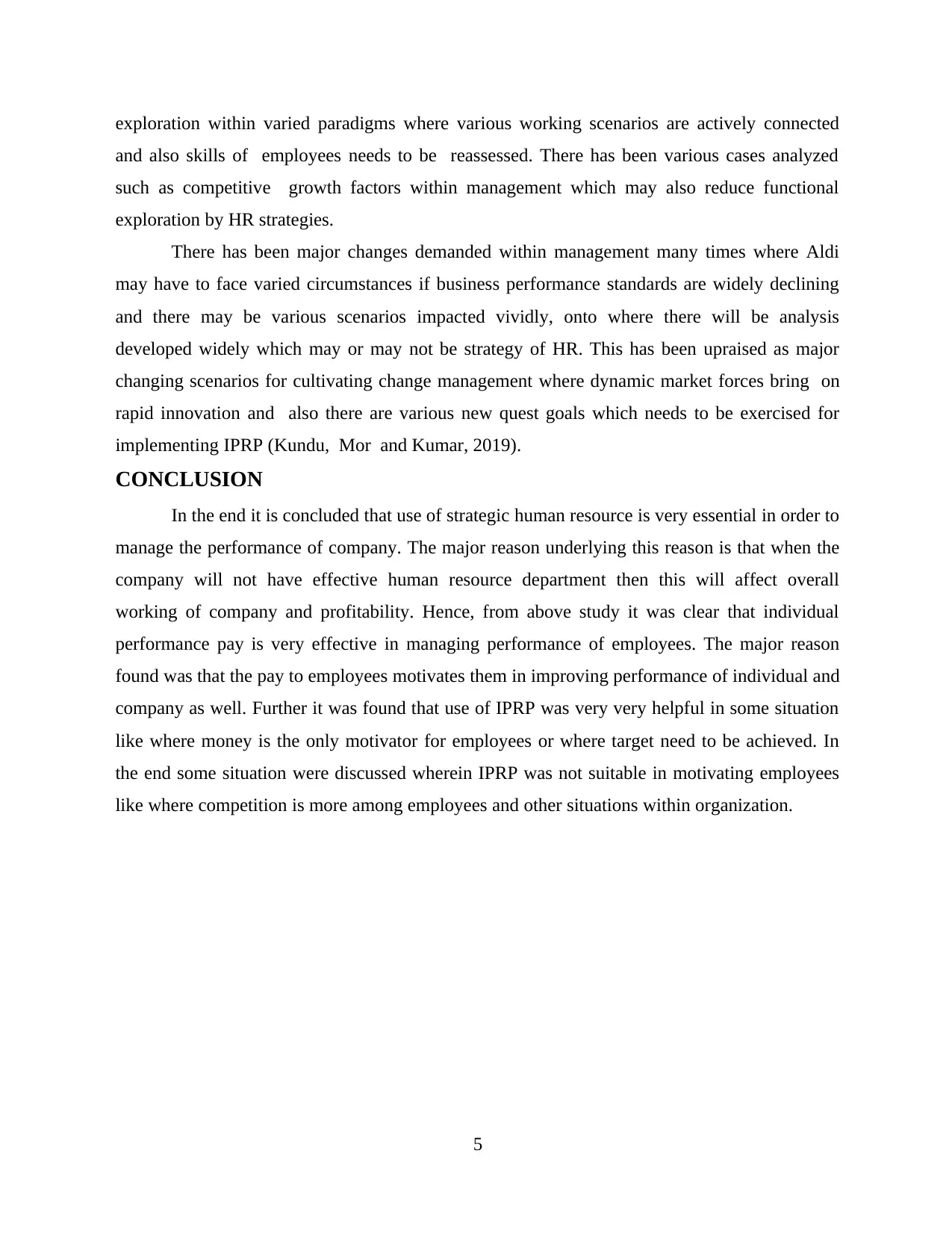
exploration within varied paradigms where various working scenarios are actively connected
and also skills of employees needs to be reassessed. There has been various cases analyzed
such as competitive growth factors within management which may also reduce functional
exploration by HR strategies.
There has been major changes demanded within management many times where Aldi
may have to face varied circumstances if business performance standards are widely declining
and there may be various scenarios impacted vividly, onto where there will be analysis
developed widely which may or may not be strategy of HR. This has been upraised as major
changing scenarios for cultivating change management where dynamic market forces bring on
rapid innovation and also there are various new quest goals which needs to be exercised for
implementing IPRP (Kundu, Mor and Kumar, 2019).
CONCLUSION
In the end it is concluded that use of strategic human resource is very essential in order to
manage the performance of company. The major reason underlying this reason is that when the
company will not have effective human resource department then this will affect overall
working of company and profitability. Hence, from above study it was clear that individual
performance pay is very effective in managing performance of employees. The major reason
found was that the pay to employees motivates them in improving performance of individual and
company as well. Further it was found that use of IPRP was very very helpful in some situation
like where money is the only motivator for employees or where target need to be achieved. In
the end some situation were discussed wherein IPRP was not suitable in motivating employees
like where competition is more among employees and other situations within organization.
5
and also skills of employees needs to be reassessed. There has been various cases analyzed
such as competitive growth factors within management which may also reduce functional
exploration by HR strategies.
There has been major changes demanded within management many times where Aldi
may have to face varied circumstances if business performance standards are widely declining
and there may be various scenarios impacted vividly, onto where there will be analysis
developed widely which may or may not be strategy of HR. This has been upraised as major
changing scenarios for cultivating change management where dynamic market forces bring on
rapid innovation and also there are various new quest goals which needs to be exercised for
implementing IPRP (Kundu, Mor and Kumar, 2019).
CONCLUSION
In the end it is concluded that use of strategic human resource is very essential in order to
manage the performance of company. The major reason underlying this reason is that when the
company will not have effective human resource department then this will affect overall
working of company and profitability. Hence, from above study it was clear that individual
performance pay is very effective in managing performance of employees. The major reason
found was that the pay to employees motivates them in improving performance of individual and
company as well. Further it was found that use of IPRP was very very helpful in some situation
like where money is the only motivator for employees or where target need to be achieved. In
the end some situation were discussed wherein IPRP was not suitable in motivating employees
like where competition is more among employees and other situations within organization.
5
Paraphrase This Document
Need a fresh take? Get an instant paraphrase of this document with our AI Paraphraser
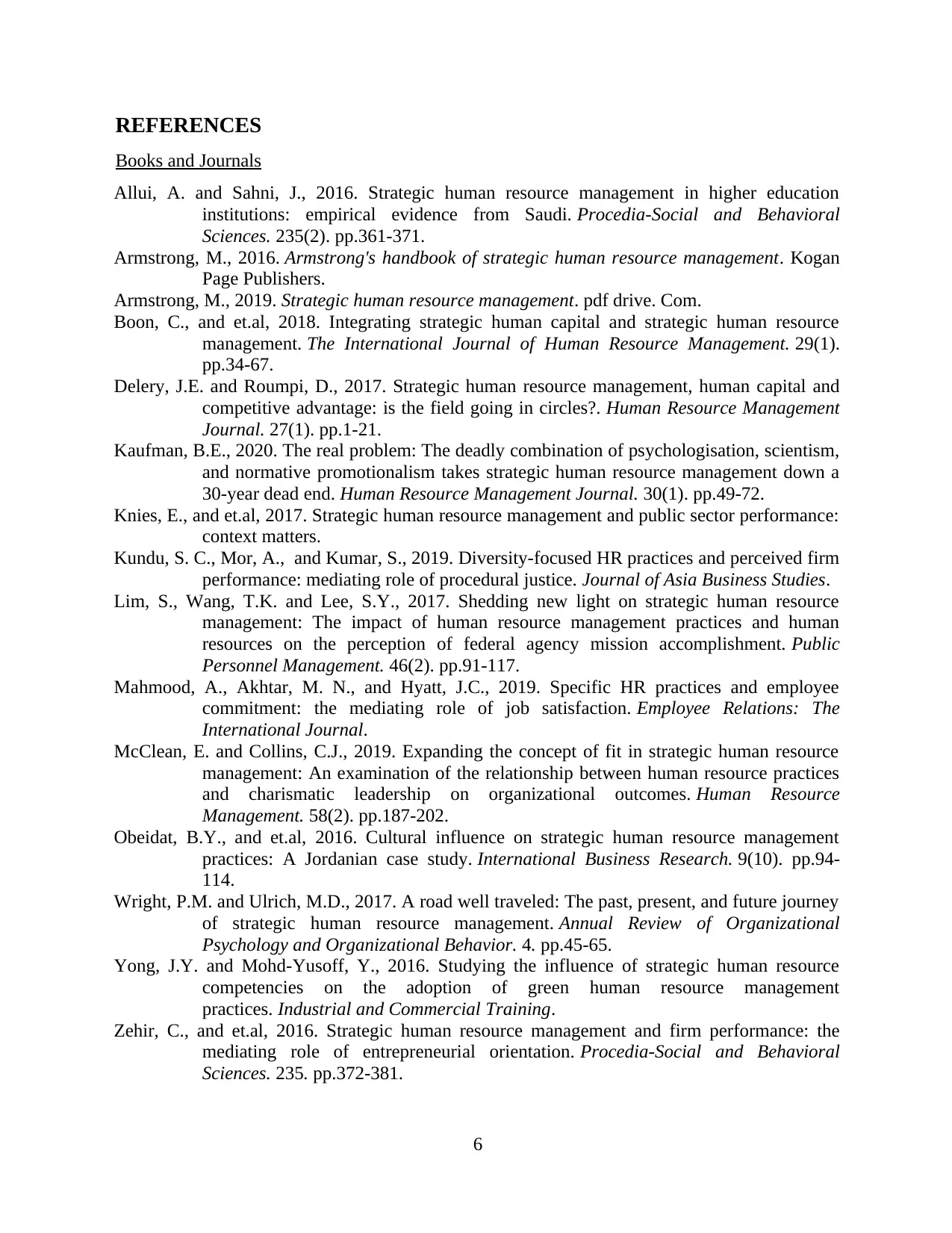
REFERENCES
Books and Journals
Allui, A. and Sahni, J., 2016. Strategic human resource management in higher education
institutions: empirical evidence from Saudi. Procedia-Social and Behavioral
Sciences. 235(2). pp.361-371.
Armstrong, M., 2016. Armstrong's handbook of strategic human resource management. Kogan
Page Publishers.
Armstrong, M., 2019. Strategic human resource management. pdf drive. Com.
Boon, C., and et.al, 2018. Integrating strategic human capital and strategic human resource
management. The International Journal of Human Resource Management. 29(1).
pp.34-67.
Delery, J.E. and Roumpi, D., 2017. Strategic human resource management, human capital and
competitive advantage: is the field going in circles?. Human Resource Management
Journal. 27(1). pp.1-21.
Kaufman, B.E., 2020. The real problem: The deadly combination of psychologisation, scientism,
and normative promotionalism takes strategic human resource management down a
30‐year dead end. Human Resource Management Journal. 30(1). pp.49-72.
Knies, E., and et.al, 2017. Strategic human resource management and public sector performance:
context matters.
Kundu, S. C., Mor, A., and Kumar, S., 2019. Diversity-focused HR practices and perceived firm
performance: mediating role of procedural justice. Journal of Asia Business Studies.
Lim, S., Wang, T.K. and Lee, S.Y., 2017. Shedding new light on strategic human resource
management: The impact of human resource management practices and human
resources on the perception of federal agency mission accomplishment. Public
Personnel Management. 46(2). pp.91-117.
Mahmood, A., Akhtar, M. N., and Hyatt, J.C., 2019. Specific HR practices and employee
commitment: the mediating role of job satisfaction. Employee Relations: The
International Journal.
McClean, E. and Collins, C.J., 2019. Expanding the concept of fit in strategic human resource
management: An examination of the relationship between human resource practices
and charismatic leadership on organizational outcomes. Human Resource
Management. 58(2). pp.187-202.
Obeidat, B.Y., and et.al, 2016. Cultural influence on strategic human resource management
practices: A Jordanian case study. International Business Research. 9(10). pp.94-
114.
Wright, P.M. and Ulrich, M.D., 2017. A road well traveled: The past, present, and future journey
of strategic human resource management. Annual Review of Organizational
Psychology and Organizational Behavior. 4. pp.45-65.
Yong, J.Y. and Mohd-Yusoff, Y., 2016. Studying the influence of strategic human resource
competencies on the adoption of green human resource management
practices. Industrial and Commercial Training.
Zehir, C., and et.al, 2016. Strategic human resource management and firm performance: the
mediating role of entrepreneurial orientation. Procedia-Social and Behavioral
Sciences. 235. pp.372-381.
6
Books and Journals
Allui, A. and Sahni, J., 2016. Strategic human resource management in higher education
institutions: empirical evidence from Saudi. Procedia-Social and Behavioral
Sciences. 235(2). pp.361-371.
Armstrong, M., 2016. Armstrong's handbook of strategic human resource management. Kogan
Page Publishers.
Armstrong, M., 2019. Strategic human resource management. pdf drive. Com.
Boon, C., and et.al, 2018. Integrating strategic human capital and strategic human resource
management. The International Journal of Human Resource Management. 29(1).
pp.34-67.
Delery, J.E. and Roumpi, D., 2017. Strategic human resource management, human capital and
competitive advantage: is the field going in circles?. Human Resource Management
Journal. 27(1). pp.1-21.
Kaufman, B.E., 2020. The real problem: The deadly combination of psychologisation, scientism,
and normative promotionalism takes strategic human resource management down a
30‐year dead end. Human Resource Management Journal. 30(1). pp.49-72.
Knies, E., and et.al, 2017. Strategic human resource management and public sector performance:
context matters.
Kundu, S. C., Mor, A., and Kumar, S., 2019. Diversity-focused HR practices and perceived firm
performance: mediating role of procedural justice. Journal of Asia Business Studies.
Lim, S., Wang, T.K. and Lee, S.Y., 2017. Shedding new light on strategic human resource
management: The impact of human resource management practices and human
resources on the perception of federal agency mission accomplishment. Public
Personnel Management. 46(2). pp.91-117.
Mahmood, A., Akhtar, M. N., and Hyatt, J.C., 2019. Specific HR practices and employee
commitment: the mediating role of job satisfaction. Employee Relations: The
International Journal.
McClean, E. and Collins, C.J., 2019. Expanding the concept of fit in strategic human resource
management: An examination of the relationship between human resource practices
and charismatic leadership on organizational outcomes. Human Resource
Management. 58(2). pp.187-202.
Obeidat, B.Y., and et.al, 2016. Cultural influence on strategic human resource management
practices: A Jordanian case study. International Business Research. 9(10). pp.94-
114.
Wright, P.M. and Ulrich, M.D., 2017. A road well traveled: The past, present, and future journey
of strategic human resource management. Annual Review of Organizational
Psychology and Organizational Behavior. 4. pp.45-65.
Yong, J.Y. and Mohd-Yusoff, Y., 2016. Studying the influence of strategic human resource
competencies on the adoption of green human resource management
practices. Industrial and Commercial Training.
Zehir, C., and et.al, 2016. Strategic human resource management and firm performance: the
mediating role of entrepreneurial orientation. Procedia-Social and Behavioral
Sciences. 235. pp.372-381.
6
1 out of 8
Related Documents
Your All-in-One AI-Powered Toolkit for Academic Success.
+13062052269
info@desklib.com
Available 24*7 on WhatsApp / Email
![[object Object]](/_next/static/media/star-bottom.7253800d.svg)
Unlock your academic potential
Copyright © 2020–2026 A2Z Services. All Rights Reserved. Developed and managed by ZUCOL.





